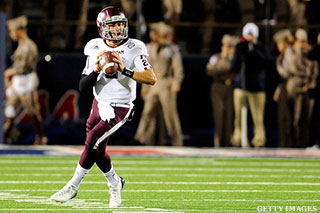When Texas A&M quarterback Johnny Manziel became the first freshman in history to win the coveted Heisman Trophy in New York City in December, his mythic season should have faded to black. In the movies, the next scene would have had him charging onto the field for his eagerly awaited sophomore year. In an era of nonstop celebrity media coverage, Manziel has been presented to the country in one misadventure after another this offseason. He has been demonized and held up as a symbol of superstar status gone wrong. The final blow is the allegation that Manziel violated NCAA rules by accepting payment for signing autographs.

This allegation puts Texas A&M, Manziel and the NCAA in a difficult situation. The school runs the risk of losing its most critical player for part or all of the season. If the Aggies play him, they run the risk of school sanctions by the NCAA. Their third game of the season is against Alabama, viewed by many as a contest to decide who finishes the season ranked No. 1. The NCAA will be disciplining its biggest star with major ramifications to college football, Texas A&M, the television networks that fund much of the sport, and Manziel himself.
A rule is a rule, and each school has compliance courses that explain prohibited behavior. If the allegation is true, Manziel did not display Heisman-like judgment. The system, however, is in major need of overhaul.
College players live on scholarship checks that barely cover basic necessities. They cannot work like non-athletes to supplement their income. If they come from disadvantaged backgrounds (which was not the case with Manziel) they may be living at a standard below the non-athletes on the same campus. These same athletes have rigid in-season demands on their time, and now participate in rigorous off-season training programs and have the double burden of academics. They see their jerseys sold in the student store, their likeness used in video games, the massive crowds in stadia -- and see no revenue in return.
Many feel exploited. League rules require them to spend a year on campus in basketball and three in football even though they may have no interest. Of course, I wish every athlete would see the benefit of a college education --but many universities have a low graduation rate for athletes spending four or five years on the campus. Let's fix that.
Athletes are already resentful at being forced to be on campus are prime targets to accept monies from agents and alums, and don't see it as a moral issue. A system of supplementing their income with shared returns from licensing and marketing needs to be designed. The professional leagues that benefit from this "farm system" also could contribute.
Finally, Manziel has been subject to a ridiculous amount of hysterical scrutiny this offseason. He showed as much self-discipline as any student on the campus throughout the training camp and 2012 season. He is a college sophomore who needed a respite from endless pressure in the offseason. He is still growing and maturing. Did any of us ever attend a party on another campus? Have an episode with alcohol? Or oversleep while we were students? Did he make some mistakes? Maybe.
But we all did in those years. We weren't trailed around 24/7 by paparazzi, cellphone photographers and gossip seekers. If Aaron Rodgers, RG III, Tom Brady or any other superstar had been hounded this way in their early collegiate off-seasons, what would we think of them? The NCAA allegation is different, but he deserves a first presumption of innocence.
-- Leigh Steinberg has represented many of the most successful athletes and coaches in football, basketball, baseball, hockey, boxing and golf, including the first overall pick in the NFL draft an unprecedented eight times, among more than 60 first-round selections. His clients have included Hall of Fame quarterbacks Steve Young, Troy Aikman and Warren Moon, and he served as the inspiration for the movie "Jerry Maguire." Follow him on Twitter @SteinbergSports.




